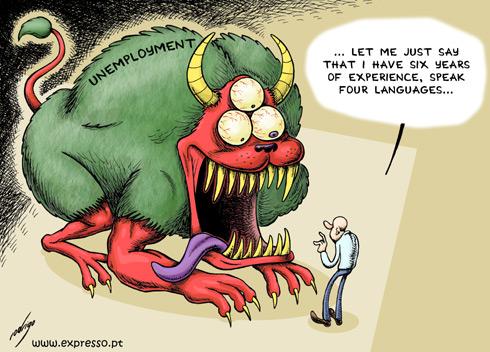First things first, I am fortunate not to be in the same position as some American families who are currently struggling on a day to day basis just to get by on the basics. For that I am thankful. Indeed, I hope not to ever have to face that position. Even so, being 'unemployed from the corporate world' does make you think a little more about decisions made on a daily basis. I guess it's a sort of inbuilt survival mode. I hope this article helps you focus a little on how to survive a corporate downsizing and get back on the track to success.
 Well, it's been 5 weeks now since I was downsized from X and I no longer get in my car at 7:00am in the morning for my drive to the corporate office. A lot of things have changed. As I was sitting at my desk in my home office this morning I was thinking that maybe it would be a good exercise to write a little about it and all those subtle little lifestyle changes that take place.
Well, it's been 5 weeks now since I was downsized from X and I no longer get in my car at 7:00am in the morning for my drive to the corporate office. A lot of things have changed. As I was sitting at my desk in my home office this morning I was thinking that maybe it would be a good exercise to write a little about it and all those subtle little lifestyle changes that take place.The most important thing to get past is the denial. This is crucial for your long term survival. Thinking "it'll be alright tomorrow" is not going to get you through. Spending more on your credit cards to compensate for the sad feeling inside is also not going to get you through. You need to admit that your income has taken a sudden decline and that you will have to change your perspective on living and spending for possibly quite some time to come.
Okay, so you've got past that. What next? First off you need to make a list of all your monthly and ad hoc expenditures. Be exact and don't miss anything out. Then add on 10% or so for all the things you also spend money on that you've forgotten about or don't capture. Now write down all the sources of income you have (i.e. Unemployment Insurance) and also write down what you have in savings. Then comes the scary part. How long do you realistically think you'll be out of work? 6 months? A year? In this economy it may actually be somewhere between those two numbers, or more. So, divide your savings between that number to give you a monthly spend and add to it your new income. Now compare that to your list of outgoings. Swallow. Then swallow again.
Obviously when you are unemployed some things have to change. Some of the little luxuries need to be struck from the spend list and then it's time to do some serious pruning. The idea here is to make your available money last as long as is feasibly possible. Don't be overly optimistic about getting another job. Try and be realistic. We are in a tough economy. So, you make alterations to your spend list and shave off a few dollars here and there, but somehow it still doesn't seem to match what you have available to spend. That's because you're still not being as cutthroat as you need to be. Now is the time to move into money conservation mode. Minimum payments, minimum expenditures, maximum efficiency. You're going to have to examine every aspect of your monthly budget line by line and make adjustments.
 When you're done with all this you know better just how long you can manage for before it gets to the nearly poverty stage. The aim is that you never have to get to this stage. But what do you do next?
When you're done with all this you know better just how long you can manage for before it gets to the nearly poverty stage. The aim is that you never have to get to this stage. But what do you do next?When you knew you were being laid off you probably made a list of a million things that you could do with your time. You probably also made a list of all the jobs you meant to get around to. Well, guess what, it doesn't quite work out like that! Along with unemployment comes personality and attitude changes. Subtle, but changes nonetheless. You have been so conditioned to doing your job every day that for some unknown reason you can't seem to get into a new routine. Instead you squander time, wander around aimless, look at job boards, chat to a few friends, and generally watch days pass by.
In the same way as you made a list of your monthly expenses you're going to have to make a list of your new routine. Otherwise you will never get things done. Make time every day for looking at and applying for jobs. Make time every day to get certain tasks done. Try and fill your normal work hours with things that are scheduled. Only use your normal non-work time to do the social things. Changing your routine is hard but it's this one thing that will ultimately determine your success. Being unemployed makes it very easy to put something off until tomorrow. Don't be tempted by that thought. You should be trying to get back to work and filling your time with useful and necessary things to do.
Stuck for ideas? Volunteer for something. Embark on a large project that needs planning and organizing. Give back to your community. Cook, redecorate, organize the apartment or house, do the garden. There are lots of potential things you can do. It's important to fill your working hours with useful and beneficial things. Don't cut yourself off from the world and spend your days watching TV, reading or playing World of Warcraft!
As time ticks by you will gradually settle into your new routine and it is this routine that will ultimately determine your success. If your routine is laziness and apathy, be prepared to spend a long time unemployed. If your routine is non-stop morning til night, then you'll be re-employed a lot quicker. The reason is fairly obvious. Staying busy focuses your mind, keeps you networking, keeps you pushing for something and substantially lowers the odds on you finding a new job.
So, there we have it. Just a few thoughts. You've been downsized; not shot at or physically injured. Get over it! You are ultimately in control of your future success and happiness. Sure, it may take some time. I didn't say it wouldn't. But it's times like this in our lives that define who we are and who we want to be.












A poignantly time post. Many are having tough times. The hardest workers usually find a way to prevail. This post paints a picture that every laid off worker should see/read.
ReplyDelete